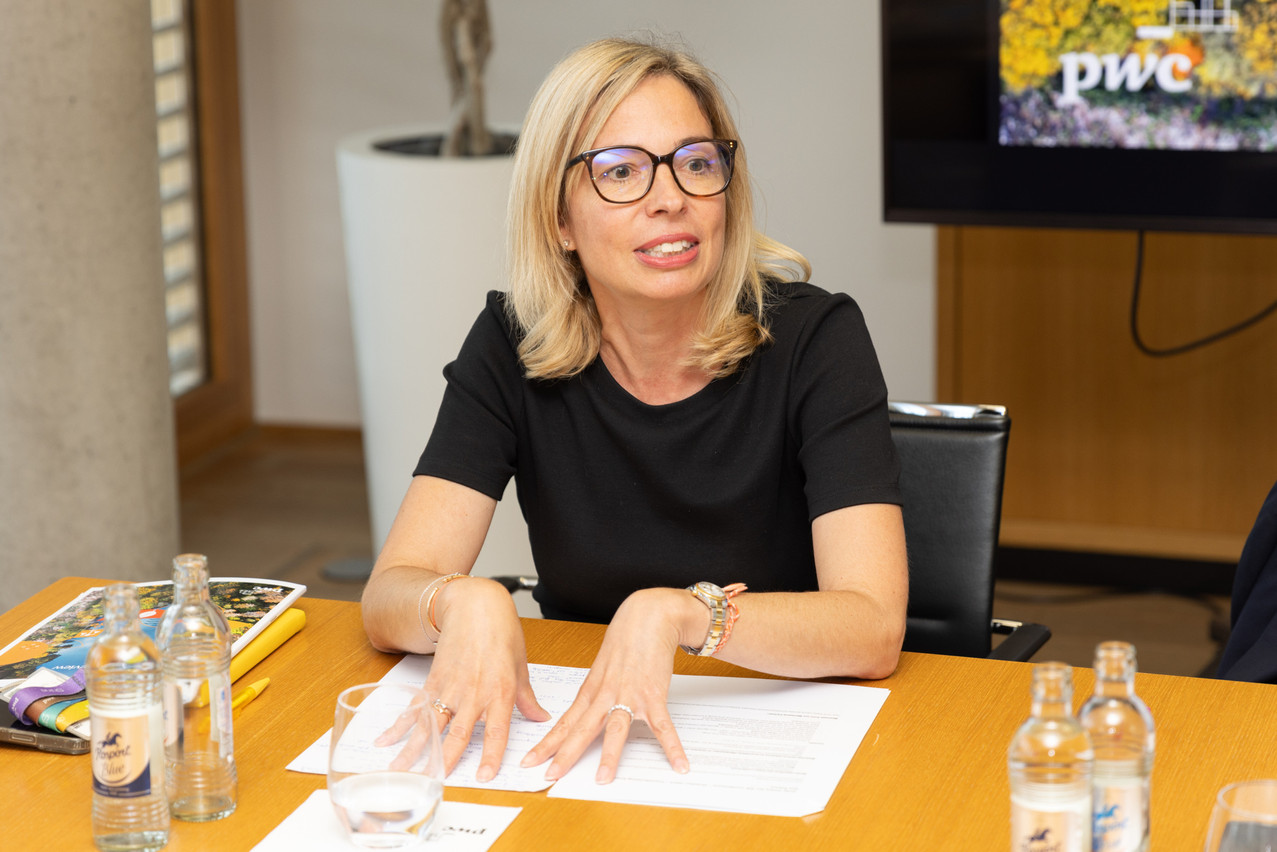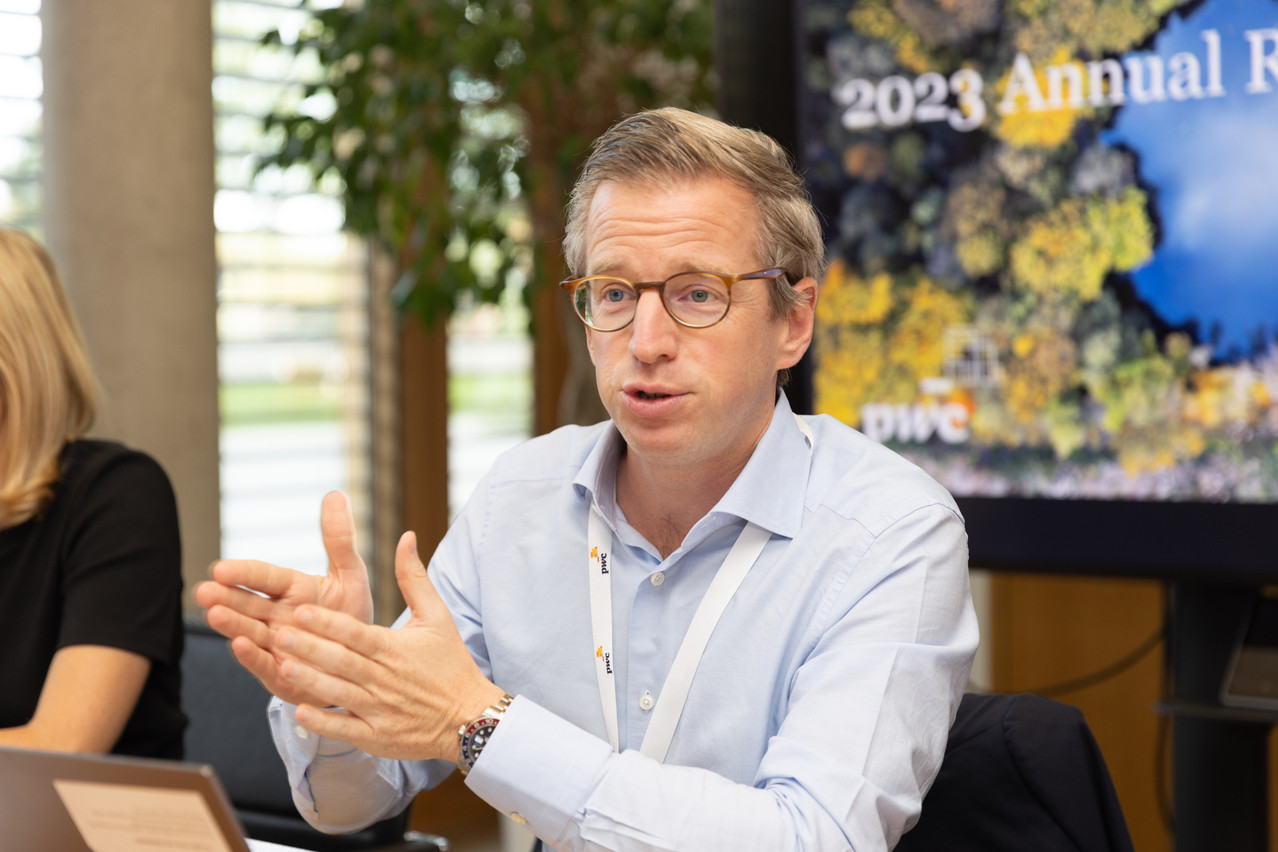Against a background of rising inflation and higher interest rates, “we had some of the strongest growth, as you can see, in the history of our firm,” said , managing partner of PwC Luxembourg, during a press briefing on the , which was published on 17 October.
Mousel, who took over the managing partner role on 1 July 2023, also highlighted the “smooth” change in the firm’s leadership team. “As you can also see in the annual review, because one of the pillars is governance, we also use that change to ensure that we have quite a good diversity in the leadership teams that we have inside our firm. For us, that’s a priority,” he said.
, who stepped into the role of people leader in July 2023, and , clients & markets leader since July 2023, were also present at the briefing. “We ensure that our leadership teams are diverse, not only in terms of gender, but also in terms of age, business, background, nationality, seniority in the firm,” said Mousel.
A few key figures
The firm’s turnover went up 16.8% to reach €634.7m for the fiscal year ending 30 June 2023.
“I think the important point here is to note that a good part of that nominal turnover increase is due to the fact that we passed on price increases to our clients,” said Mousel. “When you look at the high inflation environment, that means our cost basis is also increasing. There was the salary indexation of our people, there was the rent increases, the IT cost increases, and these were quite significant cost increases that we had. On top of that, we decided to align the salary packages of our people--we wanted to do a specific effort for them last year, so that they could cope with that inflation environment, and also so that we are really competitive on the market with regard to our salary levels.”
“All of that means that our cost is strongly increasing, and so this high turnover increase is not necessarily meaning the same amount of increase in profits.”
The firm’s advisory practice saw a growth rate of 12.2%, bringing total turnover to €130.7m and representing 20.6% of PwC Luxembourg’s total revenue for the year. The assurance practice saw 22.6% growth overall (bringing total turnover to €333.9m). This represented 52.6% of the company’s total revenue (37.3% was thanks to statutory audit, 15.3% was due to other assurance services).
PwC’s tax services grew by 10.2% during the 2023 financial year, though the firm notes that their global mobility tax and immigration services business was sold to a private equity firm in April 2022. Adjusting tax results for the disposal of the activity, tax growth would instead stand at 12.6%.
A few priorities
Mousel also touched upon some of PwC’s priorities, notably “people” and “planet.” On the people side, the firm is not only working on compensation packages, but also on the “non-compensation part,” meaning increased flexibility, well-being and learning and development opportunities for employees.
Regarding the company’s ecological footprint and decarbonisation objectives, the new PwC campus, which will be located on starting in 2027, will be “fully compliant with the EU taxonomy,” Mousel pointed out.
Prosperity
Liégeois covered some of the key drivers of growth. “First is really the alternative business, where we observe huge growth from private market players, but also traditional players who would like to invest and launch new products on the private asset side,” she said. “And also the transformation agenda.” This could refer to responses to the digital era, but also new products, such as those related to ESG or climate change.

Cécile Liégeois, clients & markets leader at PwC Luxembourg, talked about the growth of the firm. Photo: Romain Gamba/Maison Moderne
In addition, “what is really important is all the research and development and all the innovation culture that we have developed internally with our people,” said Liégeois. The firm and its staff also contribute to the business community, such as searching for ways to make an impact, making cash donations or volunteering for various associations.
Six pillars for PwC’s people
“When you look at the financial year 2023, we landed with 3,200 people,” said Haas. That’s 400 more employees compared to 30 June 2022, and represents a 14% increase in headcount. “When I started at PwC in 1998, we were 600 people. Now we are 3,200 people.”
This increase in staff members is why “proximity,” PwC’s first people-related pillar, is key. The firm has increased the number of team leaders, who each have “coachees,” from 400 to 600. The number of coachees per team leader has also been reduced, “to really create that proximity,” said Haas. They have also reworked their talent management framework to reflect on personal development plans and have a “career advice centre” where staff members can explore internal mobility with the HR department.

Roxane Haas, people leader at Pwc Luxembourg, highlighted the key elements of the company’s people strategy. Photo: Romain Gamba/Maison Moderne
Flexibility was the second pillar--this refers to flexibility in terms of working hours, teleworking possibilities (both from home and from abroad) and satellite offices. The third pillar--compensation--has also been revamped, as noted by both Mousel and Haas.
The fourth pillar concerns well-being--“this is also very important as an employer and also as employees,” said Haas. “We have an initiative called ‘Be well, work well.’ This is about proposing a sports session, kine at work, hypnosis sessions, stuff like that, and we also have an application that is called ‘Petit bambou’ that proposes for employees meditation solutions where employees can better manage stressful situations.” Detection of potential burnouts is also important, added Haas, and the firm is also working on a “speak-up culture.”
Learning and education make up the fifth pillar, which Haas notes is particularly attractive to younger generations. These are not only for technical skills, but also for soft skills.
“The last pillar I would like to mention is diversity and inclusion, which is also very important to us,” concluded Haas. PwC has embedded diversity and inclusion into training sessions to create awareness and properly equip staff. “From the 1st of January 2024, for the first time, we are going to have a dedicated D&I department, and we are going to recruit people who will be fully dedicated to the D&I dimension. The role of this department will be to ensure that D&I is embedded in our HR, and in all our actions along the employee life cycle.” PwC will also focus more on age and handicap next year, noted Haas.
Election results and looking ahead
Regarding the results of the 8 October legislative elections, “we are happy to see that the elections of the last weekend have shown that the voters also care for the growth story of the country, and have given, I would say, their confidence to parties who don’t question the fact that for Luxembourg to be successful, we need sustainable growth, but we need the growth,” said Mousel. “We think it’s a good outcome for the country, and it’s also something that we can hear our clients say that it is a good outcome for them.”
“On the long-term basis, we remain optimistic,” said Mousel. “There are a lot of challenges to tackle, but we believe that Luxembourg still has a lot of cards to play,” such as with regards to decarbonisation. “We believe that the financial centre can play a large role there--we just need to be proactive.”
